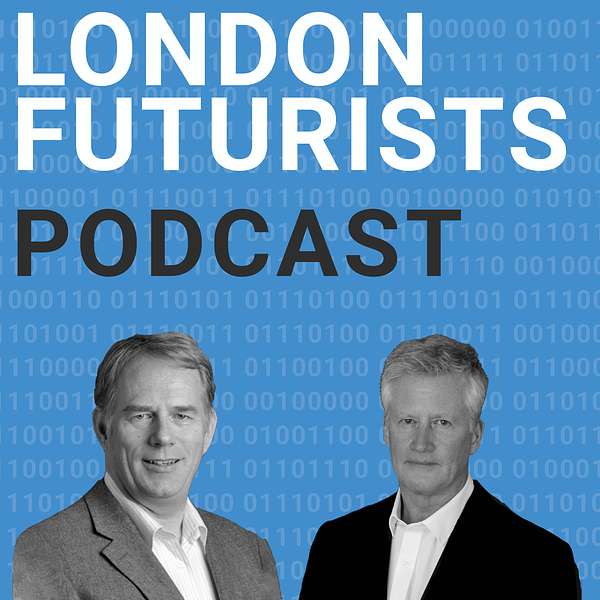
London Futurists
Anticipating and managing exponential impact - hosts David Wood and Calum Chace
Calum Chace is a sought-after keynote speaker and best-selling writer on artificial intelligence. He focuses on the medium- and long-term impact of AI on all of us, our societies and our economies. He advises companies and governments on AI policy.
His non-fiction books on AI are Surviving AI, about superintelligence, and The Economic Singularity, about the future of jobs. Both are now in their third editions.
He also wrote Pandora's Brain and Pandora’s Oracle, a pair of techno-thrillers about the first superintelligence. He is a regular contributor to magazines, newspapers, and radio.
In the last decade, Calum has given over 150 talks in 20 countries on six continents. Videos of his talks, and lots of other materials are available at https://calumchace.com/.
He is co-founder of a think tank focused on the future of jobs, called the Economic Singularity Foundation. The Foundation has published Stories from 2045, a collection of short stories written by its members.
Before becoming a full-time writer and speaker, Calum had a 30-year career in journalism and in business, as a marketer, a strategy consultant and a CEO. He studied philosophy, politics, and economics at Oxford University, which confirmed his suspicion that science fiction is actually philosophy in fancy dress.
David Wood is Chair of London Futurists, and is the author or lead editor of twelve books about the future, including The Singularity Principles, Vital Foresight, The Abolition of Aging, Smartphones and Beyond, and Sustainable Superabundance.
He is also principal of the independent futurist consultancy and publisher Delta Wisdom, executive director of the Longevity Escape Velocity (LEV) Foundation, Foresight Advisor at SingularityNET, and a board director at the IEET (Institute for Ethics and Emerging Technologies). He regularly gives keynote talks around the world on how to prepare for radical disruption. See https://deltawisdom.com/.
As a pioneer of the mobile computing and smartphone industry, he co-founded Symbian in 1998. By 2012, software written by his teams had been included as the operating system on 500 million smartphones.
From 2010 to 2013, he was Technology Planning Lead (CTO) of Accenture Mobility, where he also co-led Accenture’s Mobility Health business initiative.
Has an MA in Mathematics from Cambridge, where he also undertook doctoral research in the Philosophy of Science, and a DSc from the University of Westminster.
London Futurists
Presenting gedanken experiments, with David Brin
Use Left/Right to seek, Home/End to jump to start or end. Hold shift to jump forward or backward.
Our guest in this episode is the scientist and science fiction author Davin Brin, whose writings have won the Hugo, Locus, Campbell, and Nebula Awards. His style is sometimes called 'hard science fiction'. This means his narratives feature scientific or technological change that is plausible rather than purely magical. The scenarios he creates are thought-provoking as well as entertaining. His writing inspires readers but also challenges them, with important questions not just about the future, but also about the present.
Perhaps his most famous non-fiction work is his book "The Transparent Society: Will Technology Force Us to Choose Between Privacy and Freedom?", first published in 1998. With each passing year it seems that the questions and solutions raised in that book are becoming ever more pressing. One aspect of this has been called Brin's Corollary to Moore's Law: Every year, the cameras will get smaller, cheaper, more numerous and more mobile.
David also frequently writes online about topics such as space exploration, attempts to contact aliens, homeland security, the influence of science fiction on society and culture, the future of democracy, and much more besides.
Topics discussed in this conversation include:
*) Reactions to reports of flying saucers
*) Why photographs of UFOs remain blurry
*) Similarities between reports of UFOs and, in prior times, reports of elves
*) Replicating UFO phenomena with cat lasers
*) Changes in attitudes by senior members of the US military
*) Appraisals of the Mars Rovers
*) Pros and cons of additional human visits to the moon
*) Why alien probes might be monitoring this solar system from the asteroid belt
*) Investigations of "moonlets" in Earth orbit
*) Looking for pi in the sky
*) Reasons why life might be widespread in the galaxy - but why life intelligent enough to launch spacecraft may be rare
*) Varieties of animal intelligence: How special are humans?
*) Humans vs. Neanderthals: rounds one and two
*) The challenges of writing about a world that includes superintelligence
*) Kurzweil-style hybridisation and Mormon theology
*) Who should we admire most: lone heroes or citizens?
*) Benefits of reciprocal accountability and mutual monitoring (sousveillance)
*) Human nature: Delusions, charlatans, and incantations
*) The great catechism of science
*) Two levels at which the ideas of a transparent society can operate
*) "Asimov's Laws of Robotics won't work"
*) How AIs might be kept in check by other AIs
*) The importance of presenting gedanken experiments
Fiction mentioned (written by David Brin unless noted otherwise):
The Three-Body Problem (Liu Cixin)
Existence
The Sentinel (Arthur C. Clarke)
Startide Rising
The Uplift War
Kiln People
The Culture Series (Iain M. Banks)
The Expanse (James S.A. Corey)
The Postman (the book and the film)
Stones of Significance
Fahrenheit 451 (Ray Bradbury)
Music: Spike Protein, by Koi Discovery, available under CC0 1.0 Public Domain Declaration
Selected follow-up reading:
http://www.davidbrin.com/
http://davidbrin.blogspot.com/2021/07/whats-really-up-with-uaps-ufos.html
Elevate how you lead with insight from today’s most influential executives.
Listen on: Apple Podcasts Spotify

